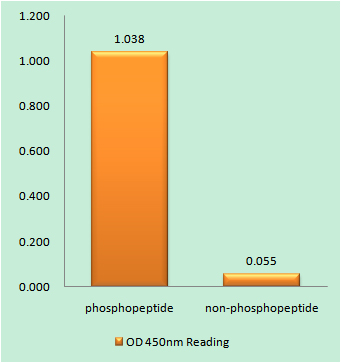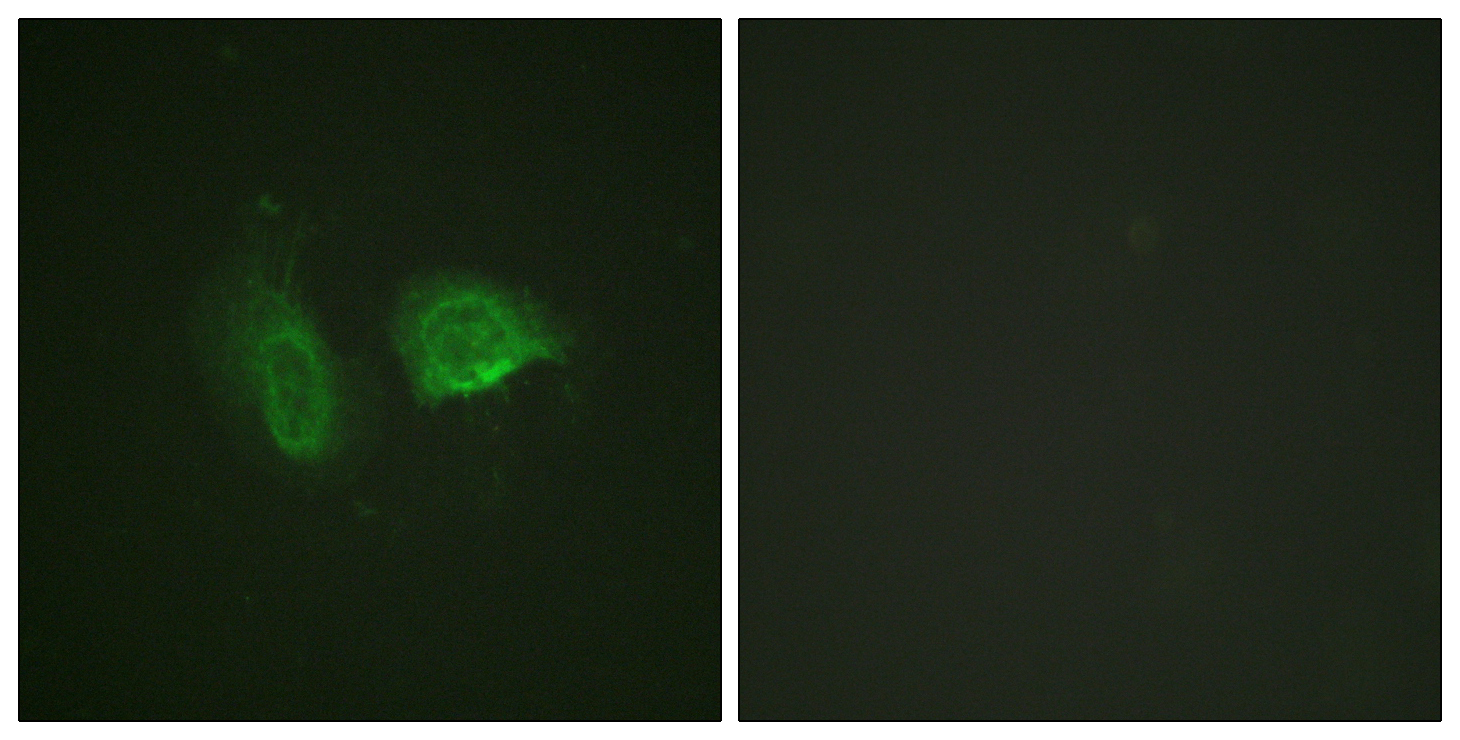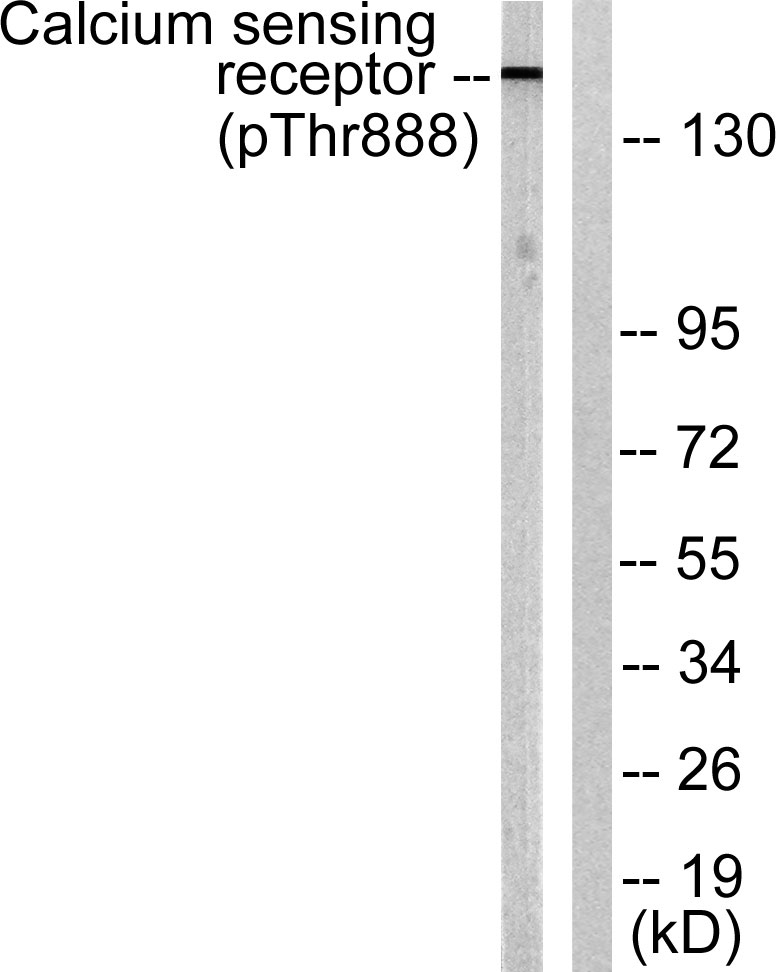CaSR (phospho Thr888) Polyclonal Antibody
- Catalog No.:YP0541
- Applications:WB;IF;ELISA
- Reactivity:Human;Mouse;Rat
- Target:
- CaSR
- Fields:
- >>NOD-like receptor signaling pathway;>>Parathyroid hormone synthesis, secretion and action
- Gene Name:
- CASR
- Protein Name:
- Extracellular calcium-sensing receptor
- Human Gene Id:
- 846
- Human Swiss Prot No:
- P41180
- Mouse Gene Id:
- 12374
- Mouse Swiss Prot No:
- Q9QY96
- Rat Gene Id:
- 24247
- Rat Swiss Prot No:
- P48442
- Immunogen:
- The antiserum was produced against synthesized peptide derived from human Calcium Sensing Receptor around the phosphorylation site of Thr888. AA range:854-903
- Specificity:
- Phospho-CaSR (T888) Polyclonal Antibody detects endogenous levels of CaSR protein only when phosphorylated at T888.
- Formulation:
- Liquid in PBS containing 50% glycerol, 0.5% BSA and 0.02% sodium azide.
- Source:
- Polyclonal, Rabbit,IgG
- Dilution:
- WB 1:500 - 1:2000. IF 1:200 - 1:1000. ELISA: 1:40000. Not yet tested in other applications.
- Purification:
- The antibody was affinity-purified from rabbit antiserum by affinity-chromatography using epitope-specific immunogen.
- Concentration:
- 1 mg/ml
- Storage Stability:
- -15°C to -25°C/1 year(Do not lower than -25°C)
- Other Name:
- CASR;GPRC2A;PCAR1;Extracellular calcium-sensing receptor;CaSR;Parathyroid cell calcium-sensing receptor;PCaR1
- Observed Band(KD):
- 140kD
- Background:
- The protein encoded by this gene is a G protein-coupled receptor that is expressed in the parathyroid hormone (PTH)-producing chief cells of the parathyroid gland, and the cells lining the kidney tubule. It senses small changes in circulating calcium concentration and couples this information to intracellular signaling pathways that modify PTH secretion or renal cation handling, thus this protein plays an essential role in maintaining mineral ion homeostasis. Mutations in this gene cause familial hypocalciuric hypercalcemia, familial, isolated hypoparathyroidism, and neonatal severe primary hyperparathyroidism. [provided by RefSeq, Jul 2008],
- Function:
- disease:Defects in CASR are the cause of autosomal dominant hypoparathyroidism (FIH) [MIM:146200]. FIH is characterized by hypocalcemia and hyperphosphatemia due to inadequate secretion of parathyroid hormone. Symptoms are seizures, tetany and cramps.,disease:Defects in CASR are the cause of familial hypocalciuric hypercalcemia type 1 (FHH) [MIM:145980]; in which the receptor has reduced activity. FHH is characterized by altered calcium homeostasis. Affected individuals exhibit mild or modest hypercalcemia, relative hypocalciuria, and inappropriately normal PTH levels.,disease:Defects in CASR are the cause of neonatal severe primary hyperparathyroidism (NSHPT) [MIM:239200]; in which the receptor has reduced activity. NSHPT is a rare autosomal recessive life-threatening disorder characterized by very high serum calcium concentrations, skeletal demineralization, and parathyroid hyperplasia
- Subcellular Location:
- Cell membrane ; Multi-pass membrane protein .
- Expression:
- Expressed in the temporal lobe, frontal lobe, parietal lobe, hippocampus, and cerebellum. Also found in kidney, lung, liver, heart, skeletal muscle, placenta.
- June 19-2018
- WESTERN IMMUNOBLOTTING PROTOCOL
- June 19-2018
- IMMUNOHISTOCHEMISTRY-PARAFFIN PROTOCOL
- June 19-2018
- IMMUNOFLUORESCENCE PROTOCOL
- September 08-2020
- FLOW-CYTOMEYRT-PROTOCOL
- May 20-2022
- Cell-Based ELISA│解您多样本WB检测之困扰
- July 13-2018
- CELL-BASED-ELISA-PROTOCOL-FOR-ACETYL-PROTEIN
- July 13-2018
- CELL-BASED-ELISA-PROTOCOL-FOR-PHOSPHO-PROTEIN
- July 13-2018
- Antibody-FAQs
- Products Images

- Enzyme-Linked Immunosorbent Assay (Phospho-ELISA) for Immunogen Phosphopeptide (Phospho-left) and Non-Phosphopeptide (Phospho-right), using Calcium Sensing Receptor (Phospho-Thr888) Antibody

- Immunofluorescence analysis of HeLa cells, using Calcium Sensing Receptor (Phospho-Thr888) Antibody. The picture on the right is blocked with the phospho peptide.

- Western blot analysis of lysates from LOVO cells, using Calcium Sensing Receptor (Phospho-Thr888) Antibody. The lane on the right is blocked with the phospho peptide.



